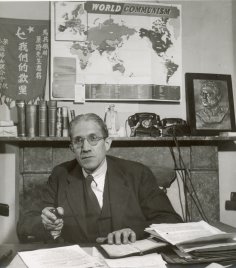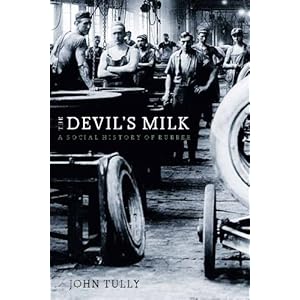history
Al Nakba: The Palestinian Catastrophe 1948 by Benny Brunner and Alexandra Jansse on Vimeo.
Al Nakba: The Palestinian Catastrophe 1948 (58 minutes, documentary, Israel-Germany-The Netherlands, 1997). Arguably the first film that seriously tackles the historic events that led to the creation of 750,000+ Palestinian refugees at the end of 1948. Based on historian Benny Morris' book, The birth of the Palestinian refugee problem, 1947-49.
Produced and directed for ARTE by Benny Brunner and Alexandra Jansse.

Maize farmers in Malawi.

By Graham Milner
In the present situation in the world, with the intermittent resurgence of fascist and neo-fascist movements in some countries, an avowedly Marxist treatment of the subject of fascism, such as Palme Dutt's Fascism and Social Revolution, deserves the attention of new generations of readers.
Rajani Palme Dutt (1896-1974) was born in England of an Indian father and a Swedish mother.[1] He grew up in a political household, where socialism and Indian independence were familiar subjects of discussion. A brilliant scholar at Oxford University (he took a double first), Dutt was a conscientious objector during the World War I, and was expelled from university in 1917 for disseminating Marxist propaganda.

Introduction by Mike Treen
May 2, 2011 -- Links International Journal of Socialist Renewal -- Below is the latest entry from the Critique of Crisis Theory blog by Sam Williams [posted here with Williams' permission]. In it he analyses the current stage of the industrial cycle and asks, “Is the economic crisis over?”.I hope that reading this post will encourage people to look more closely at the entire series on Critique of Crisis Theory, which has taken the form of a developing book on crisis theory.
The first chapter explains the biggest challenge the author faced — the fact that Marx did not leave a completed crisis theory. It was certainly the plan when Marx began Capital, but in the end only one volume was completed before his death and volumes two and three only took partial steps to a completed theory.

April 13, 2011 -- Bulletin of the Atomic Scientists -- It is tragic that Japan, the most fiercely anti-nuclear country on the planet, with its Peace Constitution, three non-nuclear principles, and commitment to nuclear disarmament, is being hit with the most dangerous and prolonged nuclear crisis in the past quarter-century -- one whose damage might still exceed that of Chernobyl 25 years ago. But Japan's anti-nuclearism has always rested upon a Faustian bargain, marked by dependence on the United States, which has been the most unabashedly pro-nuclear country on the planet for the past 66 years. It is in the strange relationship between these two oddly matched allies that the roots and meaning of the Fukushima crisis lay buried.
Ghazali Jaafar (left). Photo by Jolly Lais.
Ghazali Jaafar, vice-chairperson for political affairs of the central committee of the Moro Islamic Liberation Front (MILF), interviewed by Tony Iltis in Barangay Simuay, Maguindanao province
Introduction by Tony Iltis
April 10, 2011 -- Green Left Weekly -- The Moro people of the Philippines’ southern Mindanao Islands have never considered themselves Filipinos. The Spanish colonisers never succeeded in subjugating the Moro sultanates. However, when Spain ceded the Philippines to the US in 1898, the Moro homeland, Bangsamoro, was included.
In the ensuing war, which lasted until 1913, 20,000 Moros — fighters and civilians — were killed. The US set about integrating Bangsamoro to the Philippines through land ownership laws that delegitimised the communal land tenure systems of the Muslim Moro tribes and the non-Muslim indigenous tribes (sometimes called Lumads).
Tagiyou Aslama. Photo by Alan Bain.
Tony Iltis interviews Tagiyou Aslama

The Devil’s Milk: A social history of rubber
By John Tully
Monthly Review Press, 2011
March 13, 2011 -- With the kind permission of Monthly Review Press, Links International Journal of Socialist Renewal is honoured to be able to bring its readers an exclusive excerpt from Australian socialist John Tully's fascinating new book, The Devil’s Milk: A social history of rubber. The section below details how the peoples of the colonies exploited by the imperialist rubber barons fought back against their oppression. Links readers are urged to purchase a copy of this excellent new book. See also an interview with John Tully about his new book, "New book reveals the history of rubber: holocausts, environmental destruction and class struggle".

[See also "Libya: How Gaddafi became a Western-backed dictator". For more coverage of Libya, click HERE.]
By Peter Boyle
March 7, 2011 -- Green Left Weekly -- The dictatorial regime of Muammar Gaddafi has escalated its violence against rebel forces seeking to bring it down. On March 6, opponents of the regime were reported to be in control of a number of cities, especially in Libya’s east. Al Jazeera said on March 4 that anti-government protests in the capital Tripoli had been met with tear gas by security forces. Opponents said Az Zawiyah, a town just 40 kilometres from Tripoli that is home to an oil refinery, was mostly under rebel control.